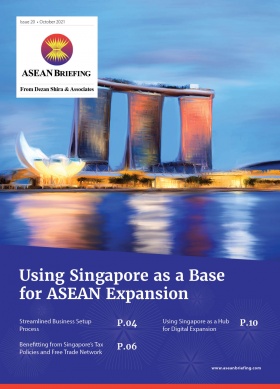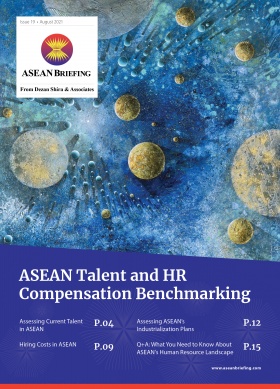China Sustains Huge Ecommerce Development Investment Flows into ASEAN
ASEAN Inbound Investments from China show strong trends in developing digital trade infrastructure
China continued to pour money into ASEAN in Q3 this year, with the region attracting 15 percent of all China’s outbound investment flows. Tracking this data is important as it shows where China investments are being made, signifying State Policy in areas of Chinese regional trade and development interest – China has a Free Trade Agreement with ASEAN – and indicating that additional, and related investments may also materialize. It also impacts downstream upon businesses affected by such investments – such as increased demand for medical supply equipment and machinery in the case of healthcare investments, or in preparations for a huge increase in regional e-commerce.
That impacts on additional investment financing and shows where the opportunities are for manufacturers and suppliers looking for new markets. The data provided is unique and was featured in the Q3 2021 issue of Asia Investment Research. That can be downloaded on a complimentary basis here.
What Asia Investment Research showed us that there were China outbound investments into several ASEAN markets, led by Singapore, and followed by Indonesia, Malaysia, Thailand, and the Philippines. Collectively, these markets saw circa 30 investments n Q3, or about 15 percent of total Chinese outbound volume.
Singapore was clearly the leading destination, attracting nearly 20 investments, across numerous industries, including real estate (three sizeable acquisitions including Q3’s largest acquisition), TMT (telecommunications, media, and technology) renewables, healthcare, financial (including crypto), industrials and consumer e-commerce.
Indonesia saw four investments, focused on TMT, fintech, and minerals (lithium). Malaysia also saw four investments across industrial, NEV, (new electric vehicles) social media, and fintech. There were investments into tech in Thailand and bitcoin into the Philippines.
The Q3 data illustrate two main points: that China is diversifying its investments into ASEAN, with a growing appetite for investment into services-related industries rather than hard infrastructure – much of the Belt and Road operational build has already been committed. China is now investing in service areas that can provide a return based on that infrastructure build and is increasingly doing so in the digital trade arena.
As can be seen, a lot of that investment heading into ASEAN is trade and finance related. Improvements in TMT go hand in hand with e-commerce. Fintech provides secure cross-border transactions without the need for constant inspections – important for a ten-nation bloc such as ASEAN with borders to China and India. Insurtech provides the equivalent in digital trade insurance. Investments in crypto will usher in new digital payment opportunities for banks and consumer-focused financial institutions. Connecting all these varying investments together shows a clear strategic vision – China is investing now in a digital ASEAN.
There are manufacturing-related investments too, but again these are new tech: New Electric Vehicles (NEV) which include both battery and driverless cars, will impact further downstream in the supply chain requirement for other auto component parts, as well as for future investments into auto power stations, and all the accessories needed to charge the vehicle. This impacts the second and third-tier manufacturers needed to supply the NEV production line.
Also, Chinese investors are now shopping around and looking for strategic minority investments in these industries. They are smart enough to realize that local regional market expertise is required to run new tech businesses (after all, ASEAN speaks English, Filipino, Indonesian, Khmer, Lao, Malay, Putonghua, Burmese, Spanish, Tamil, Thai, and Vietnamese) and are content now to invest, support and help regional businesses grow. The dividend potential – and gaining traction into China’s domestic, and the RCEP markets from next year are huge. Having Chinese minority investors on your board is a sound strategic strategy and something we will be discussing, together with performance case studies, the key industries being invested in, the capital investments made, and the resulting RoI in the next issue of Asia Investment Research next month. That complimentary issue can be reserved in advance here.
Meanwhile, ASEAN is set to strengthen its relationship with China. The bloc already has a highly valuable Free Trade Agreement with China, however, at the recent ASEAN summit, China proposed upgrading that to a ‘Strategic Comprehensive Partnership’ which will further boost regional ties between China and ASEAN in trade, investment, legal mechanisms, and security.
With China and ASEAN also part of the Regional Comprehensive Economic Partnership (RCEP) free trade agreement, the future for tech and digital investments in ASEAN looks attractive. RCEP includes all ten ASEAN nations, China, Australia, New Zealand, Japan, and South Korea, and commences from January 1, 2022, when all these nations can engage in free trade with each other under the RCEP umbrella. That is just six weeks from now. Following the Chinese money was never a bad investment strategy in China, and it won’t be in ASEAN or RCEP either.
The latest issue of Asia Investment Research is now available and deals with Q3 China and Asia inbound investments. Please visit their website for a complimentary download here.
About Us
ASEAN Briefing is produced by Dezan Shira & Associates. The firm assists foreign investors throughout Asia and maintains offices throughout ASEAN, including in Singapore, Hanoi, Ho Chi Minh City, and Da Nang in Vietnam, Munich, and Esen in Germany, Boston, and Salt Lake City in the United States, Milan, Conegliano, and Udine in Italy, in addition to Jakarta, and Batam in Indonesia. We also have partner firms in Malaysia, Bangladesh, the Philippines, and Thailand as well as our practices in China and India. Please contact us at asia@dezshira.com or visit our website at www.dezshira.com.
- Previous Article Singapore Amends Central Provident Fund Act and Retirement and Re-Employment Act
- Next Article 俄罗斯对东盟和东南亚的境外投资







